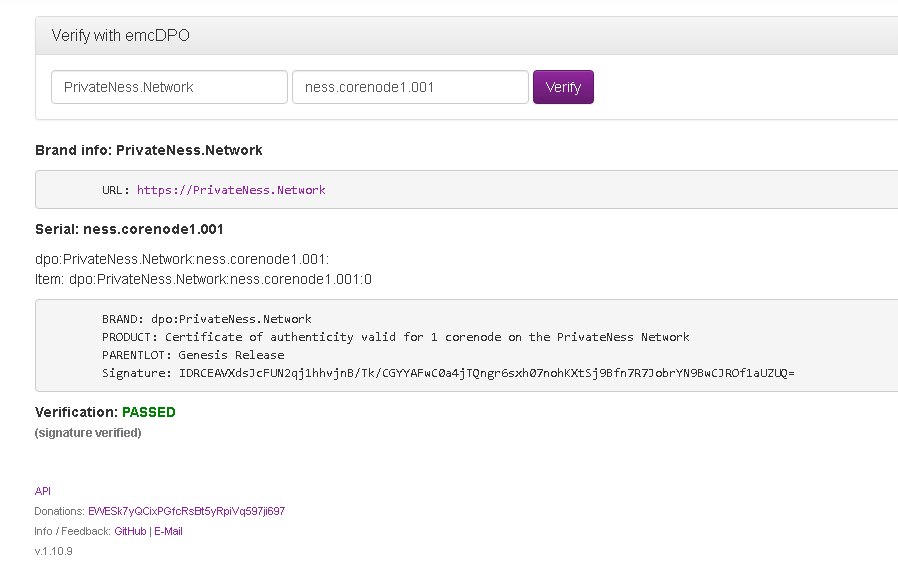The PrivateNess Network development team is proud to show you our latest development on the network. We are honored to be the pioneers in what may become the future in authenticity certifications for node operators. We believe that NFTs will be more and more present in the future and that their possibilities are almost endless in the quest for mass adoptions.
To fully understand how this certification will works for the PrivateNess Network CoreNodes, take a few minutes to analyze how the future NESS blockchain work. Let’s take the example of blockchains that work with masternodes.
Simply put, masternodes are servers that can be found on decentralized networks. It has unique functions that make it different from ordinary nodes since ordinary nodes typically cannot complete such functions. They include numerous features, including things like instant transactions, private transactions, and direct send.
Each network has its masternodes, with unique features, and their pros and cons. That way, no two masternodes are alike, and every system approaches them differently. However, while masternodes can be quite rewarding, and are closely connected to crypto mining, they are also an entirely different thing, and a lot of newcomers mistakenly confuse the two.
Main differences between mining and masternodes
Since masternodes can do much more than regular nodes, running them also involves a more significant investment. However, those who run masternodes are also very motivated, as they are rewarded for doing so via a portion of block rewards. Depending on the network, masternodes operators may be rewarded once per day, or even several times per day.
However, it is essential to understand that masternodes are not mining. A lot of people also mistakenly assume that masternodes are an extension of PoS, where cryptos are not mined but staked. However, this is also not true, as PoW project can use masternodes as well.
Running a masternode allows operators to generate a passive income by simply holding on to their coins, which is a method similar to how stakes work in PoS. It is different from mining as earning money doesn’t require obtaining expensive crypto-mining gear. The money earned by running a masternode depends on various factors, which means that there is no simple answer. Each project works differently, each masternode is unique, but one thing that remains true is that running a masternode can be very profitable if you select the right coin, and its value surges in time.
Anyone can run a masternode. The objective is to have enough decentralization to ensure that no single person controls a significant fraction of the masternodes. However, to avoid bloating the network with unnecessary masternodes or encouraging reckless operators, there is one condition that needs to be fulfilled: proof of ownership. The coins don’t need to be in the masternode, but they need to be kept in a certain way that is transparent to the entire network. If the owner moves or spends those coins, the masternode stops working and payment ceases.
Proof of ownership

Verify with emcDPO:
explorer.emercoin.com/dpo/privateness.network
In order to guarantee the absolute authenticity of our CoreNodes in the PrivateNess Network ecosystem and in order to eliminate any security breach, we have integrated a feature allowing authentication by verified NFT which undoubtedly guarantees the authenticity of CoreNodes. This certificate of authenticity will be required so that the CoreNodes can perform all forms of operations required on the Fiber Chain.
Unlike traditional masternodes where operators must lock a considerable amount of native coins in order to keep their masternode active, the Fiber Chain technology behind the NESS blockchain built in CX language does not require it. This is why we have implemented a certification of authenticity in the form of NFT which guarantees that each operators has the required collateral amount needed. That amount is locked so it cannot be used as long as they remains active.
This NFT certificate which is equivalent to a unique value of 20,000 NESS will be available on our Marketplace and/or by OTC and there will be no certificate issued limit (as long as they respect total available supply). This certificate could also be sold for a one-off amount of 20,000 NESS by the owner when he decides to deactivate his CoreNode. NESS coins used to create NFTs certificates will automatically lock like other traditional blockchains do.
In everyday life, you can compare these certificates of authenticity for corenodes as title deeds. They ensure that the property is yours and you can buy it or dispose of it as you see fit. Only the value in fiat can fluctuate depending on the supply and demand of native NESS coins in the market.



Comment